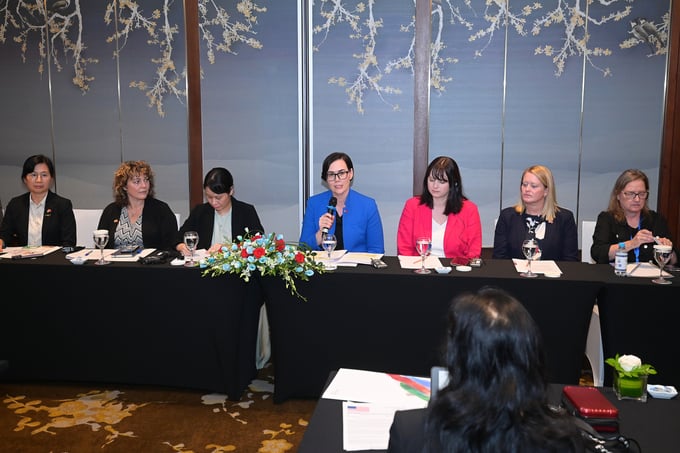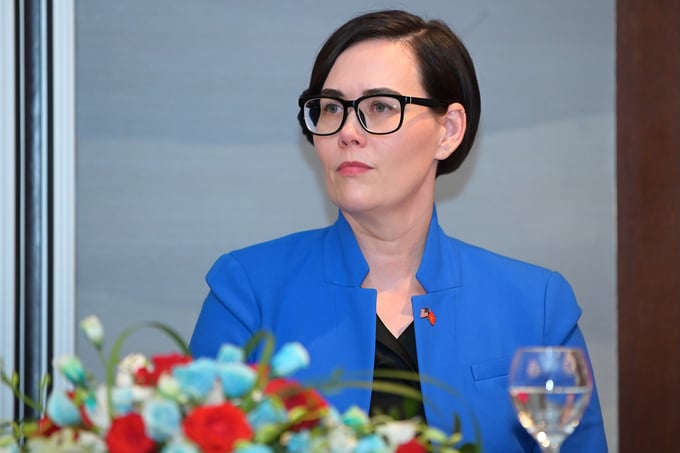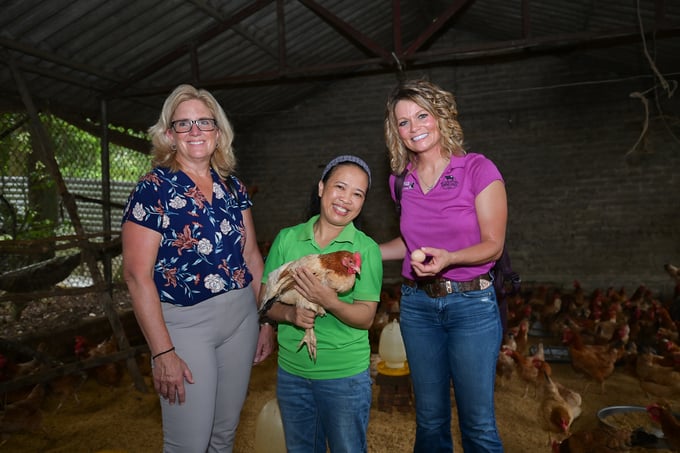May 24, 2025 | 16:21 GMT +7
May 24, 2025 | 16:21 GMT +7
Hotline: 0913.378.918
May 24, 2025 | 16:21 GMT +7
Hotline: 0913.378.918

Under Secretary Alexis Taylor addressed a press conference that marked the largest agricultural trade mission in the history of two countries’ trade relations. Photo: Tung Dinh.
In honor of the one-year anniversary of the Comprehensive Strategic Partnership, a U.S. trade delegation of 100 participants, including 35 U.S. business representatives, officials from nine State departments of agriculture and representatives from 21 USDA cooperators. The multi-city trade mission spanned Ho Chi Minh City and Hanoi, even attracting international buyers from Burma (Myanmar), Cambodia, and Thailand.
The agricultural trade mission was led by Under Secretary for Trade and Foreign Agricultural Affairs, Alexis Taylor, marking her second trip to Vietnam in two years. During a press briefing, she explained the trade mission's focus on connecting with key importers for business-to-business meetings and learning about local and regional market conditions through site visits and briefings with industry experts and government officials in Hanoi and Ho Chi Minh City.
According to Under Secretary Taylor, markets in Southeast Asia hold immense opportunity for U.S. exporters. Vietnamese consumers are increasingly turning to U.S. products to meet growing demands for food processing, retail, and restaurant sectors, with exceptional presence in tree nut, fresh fruit, poultry, beef, and pork industries.
“Our presence is comprehensive and ambitious in Vietnam, working frequently with the Ministry of Agriculture and Rural Development and other government agencies. Our teams here work tirelessly to help Vietnam improve its regulatory infrastructure and science-based decision-making processes, advancing efforts on agricultural biotechnology, market access of U.S. products, maximum residue limits, fertilizer use, sustainability, and more”, said Under Secretary.
The trade mission follows the recent expansion of market access for U.S. peaches and nectarines and coincides with the first anniversary of the Vietnam - U.S. Comprehensive Strategic Partnership when both our leaders reaffirmed the importance of economic, trade, and investment cooperation and innovation- driven inclusive economic growth as the core foundations and sources of momentum in the bilateral relationship.

Under Secretary Taylor stated that agriculture plays a pivotal role in the strong bilateral trade relationship between Vietnam and the United States
Addressing the press conference, Under Secretary Taylor stated that agriculture plays a pivotal role in the strong bilateral trade relationship between Vietnam and the U.S., which reached a two-way trade value of 3.8 billion USD.
She informed the media: “The size and diversity of the U.S. delegation visiting Vietnam underscores America’s keen interest in expanding agricultural markets. Vietnam, being a top producer of commodities like cotton, presents numerous opportunities for growth in new product categories, including fresh and consumer market fruits. Additionally, there is a significant preference among Vietnamese consumers for American meat, which opens the door for exports of not only high-quality meat but also superior genetics and complementary feed products.”
The ongoing strategy of building these trade relations is clearly reflected in this visit, emphasizing the importance of interpersonal connections in fostering robust trading partnerships. The U.S. aims to deepen its understanding of Vietnam’s market needs and to build enduring relationships with local stakeholders.
For the USDA leader, this commitment is not one-sided; investment flows are increasingly reciprocal. With this being our second visit to Vietnam, and coinciding with the one-year anniversary of the Comprehensive Strategic Partnership, it’s essential to demonstrate the U.S.'s dedication to this partnership and the broader goal of strengthening economic ties.
A journalist posed a question of competition between American and Vietnamese products in the Vietnamese market. Regarding this topic, while American and Vietnamese products may compete in the Vietnamese market, the competition can also be seen as a healthy catalyst for innovation and quality improvement on both sides, according to the Under Secretary.
The U.S. is committed to not just exporting products but also collaborating with Vietnamese partners to enhance agricultural practices, boost productivity, and meet the evolving preferences of Vietnamese consumers. This approach allows for a complementary relationship where both nations benefit from shared knowledge, technology, and market access.

The International Year of the Woman Farmer brought two outstanding female farmers from the United States to Vietnam and Indonesia to meet with the women's agricultural community in August 2024. Photo: Tung Dinh.
Beside trade relations, the agricultural partnership between Vietnam and the U.S. is also manifested in the collaborative efforts to realize the International Year of the Woman Farmer 2026.
“As a woman in agriculture, I am particularly proud of the USDA's declaration of the International Year of the Woman Farmer. I had the privilege of being at the United Nations in May when the regulation was approved, witnessing overwhelming support from Vietnam right from the initial development stages to the final passage. It is an honor to be part of one of the first events aimed at promoting women’s roles in agriculture, and this initiative will continue through 2026 with a focus on amplifying women’s voices in the sector”, stated Under Secretary Taylor.
The USDA representative recognizes that Vietnam has its own unique agricultural narrative, and it is vital to share these stories while also highlighting the broader challenges faced by women in agriculture globally. These include issues like limited access to land, credit, and financing, barriers to trading and technology, and restricted opportunities for leadership roles.
Through the International Year of the Woman Farmer initiative, the U.S. aims to invest in policy solutions that raise awareness of these challenges and work towards tangible changes in the agricultural sector worldwide. Enhancing food and nutrition security is intertwined with improving the livelihoods of women in agriculture, making this mission crucial for our collective future.

(VAN) In the tranquil wetlands of Van Long, there are quiet souls who guard the forests, nurture the waters, and oversee every bird and troop of langurs as protecting the essence of a living heritage.

(VAN) WWF, GIZ, IUCN, UNDP call for biodiversity conservation and sustainable development must be regarded as a unity in strategies for a green future.

(VAN) On celebration of International Day for Biological Diversity, Deputy Minister Nguyen Quoc Tri called for practical actions to address nature and biodiversity conservation.

(VAN) Dr. Hoang Thi Thanh Nhan – Deputy Director of the Nature and Biodiversity Conservation Agency – highlighted this on the International Day for Biological Diversity, May 22, 2025.
![Ho Chi Minh city adapts to climate change: [2] Accelerating action](https://t.ex-cdn.com/nongnghiepmoitruong.vn/608w/files/chiqk/2025/05/22/4024-4220-bien-doi-khi-hau-1-100626_766.jpg)
(VAN) Clearly recognizing the challenges posed by climate change, Ho Chi Minh city has swiftly shaped its policies and implemented practical solutions to adapt.

(VAN) Rice straw is no longer just a discarded byproduct, but it is becoming a green resource that helps farmers in the Mekong Delta reduce emissions and promote circular, sustainable agriculture.

(VAN) Other Effective Area-based Conservation Measures (OECMs) are solutions that contribute effectively to achieving the goals of the Kunming–Montreal Global Biodiversity Framework.